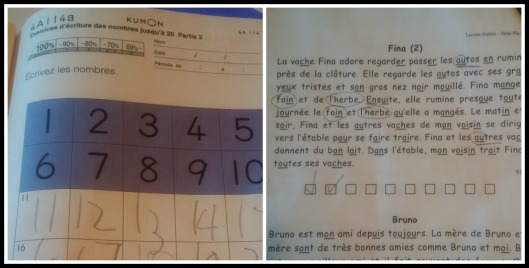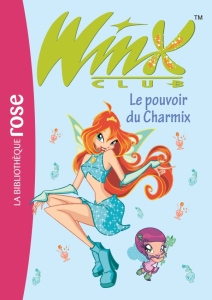Tags
bilingualism, early readers, French, French Canadian history, Grade One, Grade Two, Kumon, learning to read, Ontario history, reading
I’ve mentioned here before that my husband is francophone and our daughters go to French school.
On Friday, my eldest – now in Grade 2 – was VERY excited about Franco-Ontarian Day. They had to wear green and white – like the flag – and they were promised much other Franco-fière fun.
She spent much of Thursday afternoon tracking down her T-ball shirt from two years ago which was the only thing she owned in the correct colours.
And she came home with this fun craft:
Raising bilingual children, and sending children to French school as the Anglophone part of that parental mix, has its challenges. But I also know giving my children an education in both our official languages from an early age is a gift that will benefit them their whole lives. So I am beyond supportive of the extra effort.
So, in honour of Franco-Ontarian Day – which is actually today – I thought I’d spend a bit of time reflecting on that bit of their heritage, and what it currently means in our family.
The French presence in Ontario stretches back over 400 years. In 1610, Étienne Brûlé, sent by Samuel de Champlain, was the first European to set foot in what is now Ontario. You can read more about that here. On my end, I suspect I have YEARS of history homework coming through which I can recommit all that to memory.
Ottawa today has a large francophone community: 143,220 by last count. Data also shows that 28.4% of Ottawa Anglophones (like me!!!) speak both official languages and 38.3% of the population speak both French and English.
Broadening back out to Ontario, stats show that 582,690 of the province – or 4.8% – are members of the Ontario francophone community, making Ontario the second largest francophone community in Canada after Québec. Also noteworthy is the fact that 41.5% of Ontario Francophones live in Eastern Ontario. Indeed, my husband comes from one of those small Eastern Ontario towns that help contribute to that statistic.
Practically speaking for my family back here in Ottawa, all this results in there being a really good French Catholic elementary school walking distance from our house. Indeed, the school was one of the selling points for the neighbourhood when we bought our house.
As mentioned, my eldest is in Grade 2 there and my youngest just started Junior Kindergarten.
At home we speak both languages. I speak to the kids in English and my husband speaks to them in French. Studies show this is a good approach to raising bilingual kids. However, English certainly dominates, both in the house by a bit, and then outside by a lot. Before getting into the before and after care program at the school this year, they both also had an English daycare provider because, while I did look for French care, she was simply the best provider we found.
Also, the English grandparents are in town, while the French family is not.
As you can appreciate, language influences form a bit of a complicated puzzle.
As my eldest started Grade One, while she could speak both languages, it became clear she needed extra support. I quickly learnt how challenging it was to find French support in Ottawa.
While English tutoring programs abound, I finally settled on a private French tutor for my daughter because I simply couldn’t find any French homework clubs.
We also have her in Kumon Math, because it is offered in French (while their reading program is not).
And I wrote a bit this summer about other resources we used to keep up her skills as she got ready for Second Grade.
But getting back to now, for those interested, homework and Kumon at week two back to school look like this:

Grade Two Homework and Kumon Math – week two. The Kumon – which we are doing to “catch up” doesn’t seem wildly behind the math homework yet. So I’m hopeful this will help with math as well as writing skills, which are also still a challenge.
Reading club at school also re-started this week (week four). Given she can choose what she likes to read, I think this will help. This past week, our nightly reading was this:
Anyone familiar with my blog may know that I’ve previously discussed my feelings on these here fae.
Given that was in 2014, suffice to say this book selection shows I lost that battle with my daughter.
That said, if it helps her learn to read, I’m in!
The level is too advanced for her at the moment, so I’m reading to her, but she’s answering questions and excited to read another chapter each night, so I’m hopeful they will help with fluency and comprehension.
Besides that, the other bit of excitement recently is that she continues to ask to play on Radio-Canada Jeunesse – ie: we are no longer “forcing” her to watch French television!
All that to say, happy Franco-Ontarian Day from one mother who is working out daily how to encourage and raise two Franco-Ontarian daughters.
Tips, advice and encouragement welcome!


This is excellent. In the south western part of Ontario, where I live, lots of friends and family send their children to French immersion school, but sadly it rarely lasts more than a few grades. If the parents don’t speak French, eventually they find it very hard to help the kids with homework. Though they start out wanting to do something, to give their children a multi lingual education, the reality isn’t quite so easy or simple. I learned French, from grade two to grade nine, got a French guide dog and needed to know French commands, but I only speak English and I am disappointed but proud to live here in Canada where both languages are celebrated.
LikeLike
Ah – I think there are less francophones in your part of Ontario, right? It is so very hard to reinforce and learn a language if there isn’t a call to really use it. Even here, where there is, I take your point about best intentions meeting how much actual work it is to learn a second language. That said, I look at the number of people I work with trying to learn it as adults, and – again – I think I will keep up the efforts now with my kids. We hit a point last year where I seriously thought my eldest would be better in English school, but again – we’ll keep at it for now.
Thanks for sharing your thoughts.
LikeLiked by 1 person
That’s pretty cool – I always forget how French Canada is. I love that your kiddos will know their history and be bi-lingual. That’s HUGE. Happy Franco-Ontarion Day! I knew zero about this, so thanks for the little education. 🙂
LikeLike
Thanks! I must say, it’s an interesting ride as the English parent with kids in French school. Among other things, I think it also helps my French – which is a bonus (and something I try to think about when other aspects frustrate me).
And happy to share a little history with you on this fine Sunday :).
LikeLiked by 1 person
http://www.ajournaledlife.us/29-bloggers-i-cant-quit/
I haven’t been commenting for awhile, but you’re one of the Bloggers I Can’t Quit!
LikeLiked by 1 person
Ah! Thanks so much – so nice to hear from you again!
LikeLike